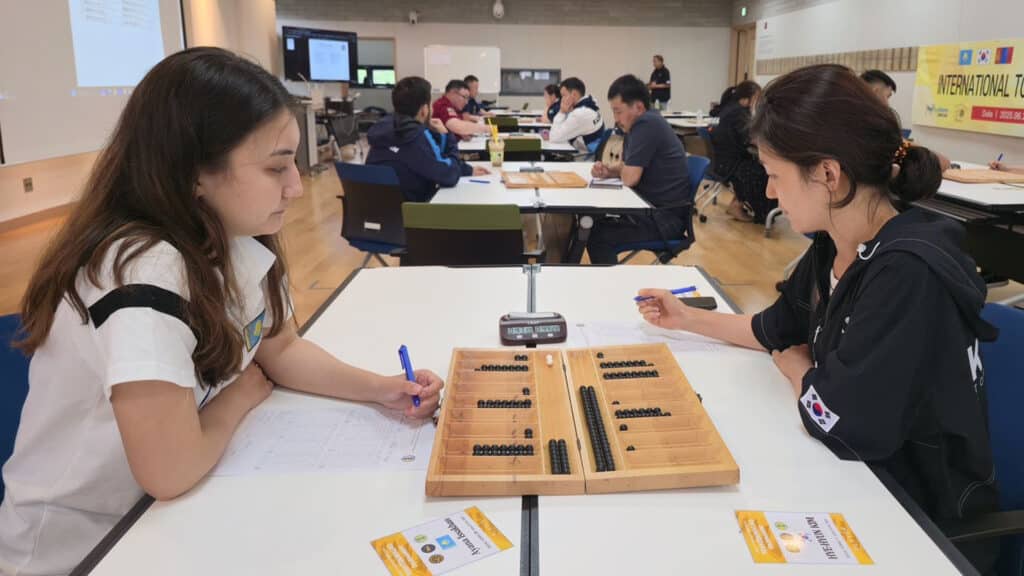
A federation dedicated to togyzqumalaq, an ancient Kazakh strategy board game, has been officially established in South Korea on June 28, according to the press office of the Togyzqumalaq Federation of Kazakhstan.
A game in Seoul
The newly formed organization is led by Mrs. Sanghee Oh, president of the O’Brain Math & Game Academy, a Seoul-based training center.
The launch of the federation coincided with the first international togyzqumalaq tournament in South Korea, held in Seoul from June 24 to 30. Players from Kazakhstan, Mongolia, India and South Korea took part in the event.
The promotion of togyzqumalaq in South Korea is part of an ongoing collaboration with the World Togyzqumalaq Federation, led by Alikhan Baimenov of Kazakhstan. In 2023, Baimenov signed a memorandum of understanding on behalf of the federation with the O’Brain Academy. Since then, the game has been incorporated into the curriculum of specialized educational programs across South Korea.
Kazakh mancala
Togyzqumalaq or toguz kumalak («nine pebbles») is a mancala family game played in Kazakhstan. Similar games are played in Turkic-speaking nations, such as toguz korgool in Kyrgyzstan, mangala or göçürme in Turkey.

In 2020, togyzqumalaq, along with its Kyrgyz and Turkish variations, was inscribed on UNESCO’s Representative List of the Intangible Cultural Heritage of Humanity.
Masters of wood and stone carving, as well as jewelers, craft both elaborately decorated and practical boards and pellets («kumalaks»), reflecting traditional worldviews and artistic creativity. The game helps develop players’ cognitive, motor and social skills, enhances strategic and creative thinking, and teaches patience and consideration.
Is it more complex than chess?
The game can be played with pellets made of stone, wood, metal, bone, nuts or seeds, which are distributed across the pits; the player who gathers the most pellets wins the game. There are several variations of the game. For example, the board may have two, three, four, six or nine pits, depending on the number of players, and the duration of the game also varies accordingly.
Often referred to as the «algebra of the shepherds» or «chess of the steppes,» togyzqumalaq derives its complexity not from varied pieces and moves, as in chess, but from its dynamic and constantly shifting numerical landscape. A key argument for toguzqumalaq’s complexity is the sheer volume of calculation required. Unlike chess, where pieces are removed from the board, the 162 pellets in togyzqumalaq (81 per player) remain in constant circulation throughout the game.

In games like chess and checkers, only one or two pieces move at a time. In togyzqumalaq, several stones can move in a single turn, affecting the state of every pit on the board. This complexity is what makes the game so intellectually challenging.
Global and digital game
Togyzqumalaq is now played in more than 50 countries worldwide, according to Kazinform. It has a strong presence in Kazakhstan, Kyrgyzstan, Mongolia, China, Russia and Uzbekistan. Among European countries, the game is gaining traction in the U.K., Latvia, Hungary, Germany, Turkey, Romania, France, the Czech Republic and Switzerland.
Togyzqumalaq is currently available on three major online platforms: Iggamecenter.com, Playstrategy.org and Playok.com. These sites allow players to compete, sharpen their skills and participate in tournaments. During the COVID-19 pandemic, these platforms played a key role in expanding the game’s global reach.
Additionally, mobile apps for Android and iOS have made it even easier to play togyzqumalaq anytime, anywhere. Thanks to these digital tools, fans no longer need to seek out opponents in person — they can play directly against the program or join online matches around the world.
Notably, the Kyrgyz version of togyzqumalaq, toguz korgool, was featured in the competitive program of the 2024 World Nomad Games in Astana.


